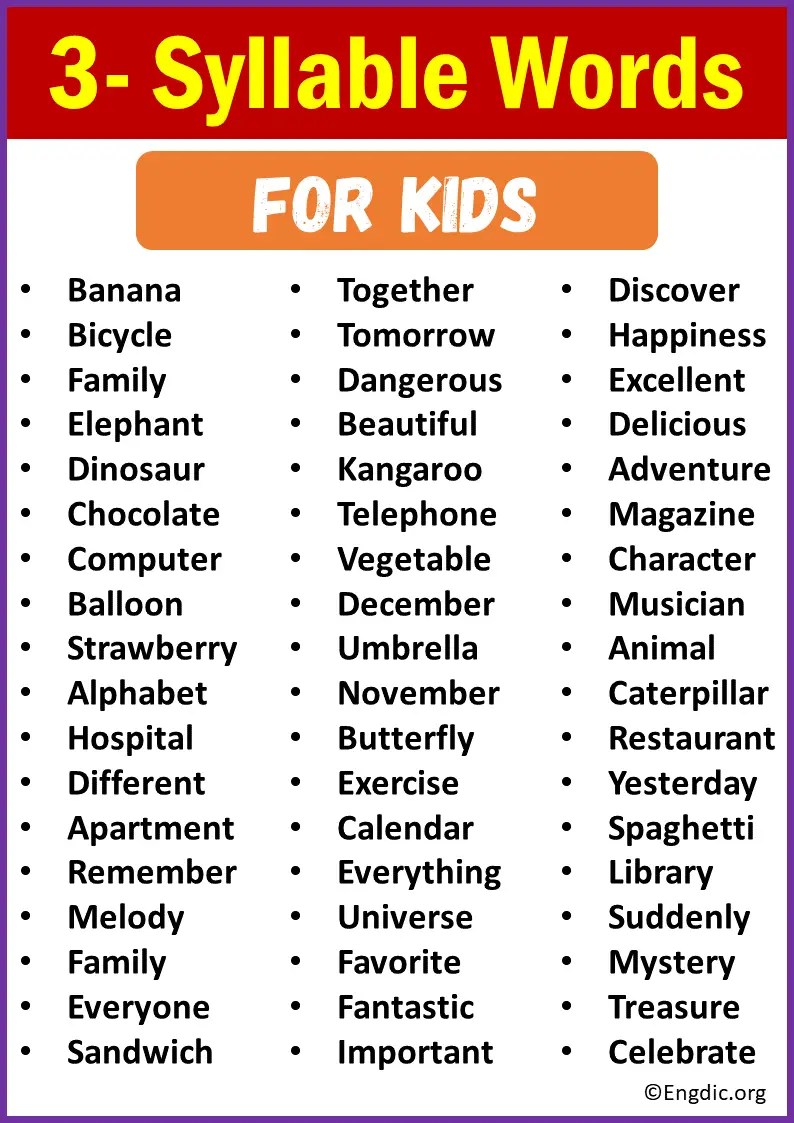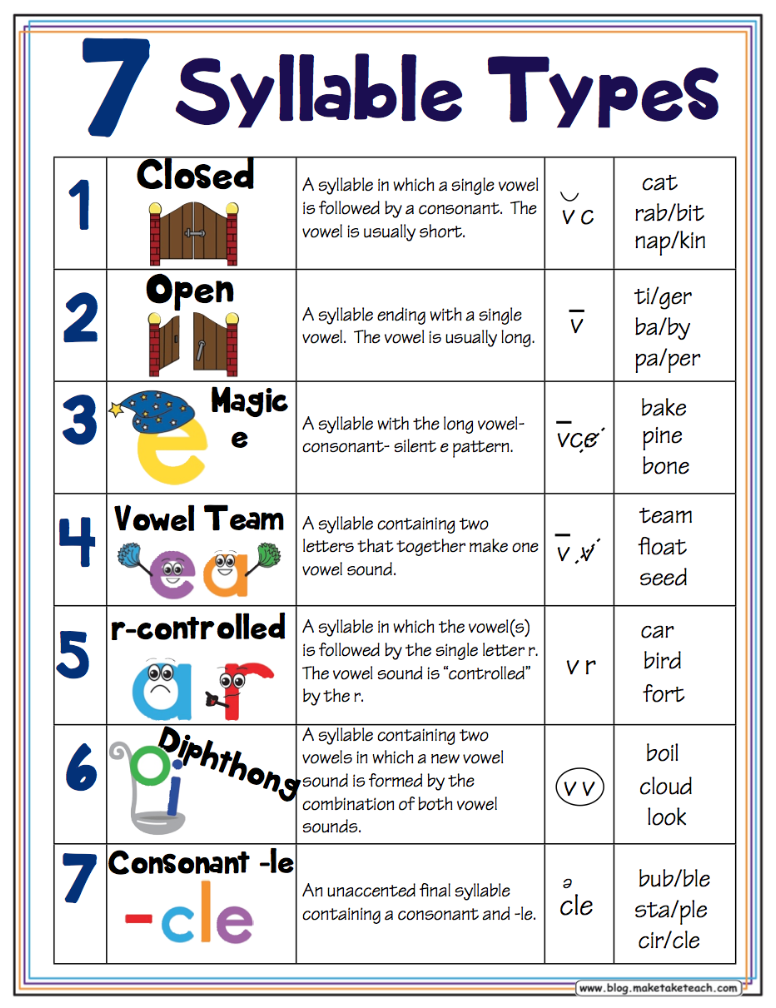Introduction to Three Syllable Words
Three syllable words are a fascinating aspect of the English language that often go unnoticed in our daily conversations. These words, which consist of three distinct vowel sounds or spoken beats, can add rhythm and variety to our speech and writing. Understanding and using three syllable words effectively can enhance your vocabulary, improve your communication skills, and even make your writing more engaging. In this article, we'll delve into the world of three syllable words, offering tips, tricks, and fun facts to help you master their use. Whether you're a student looking to improve your language skills, a writer seeking to add flair to your prose, or simply curious about the intricacies of the English language, this guide is for you.
Why Three Syllable Words Matter
Three syllable words play a critical role in the English language for several reasons. Firstly, they strike a balance between simplicity and complexity, making them ideal for communication that is both clear and expressive. Unlike shorter words, they allow for more nuanced expression, and unlike longer words, they are typically easier to understand and pronounce. Additionally, three syllable words are abundant in the English language, appearing in a wide range of contexts from everyday conversation to academic writing. By incorporating these words into your vocabulary, you can enhance your ability to convey ideas and emotions effectively. Furthermore, they often help in maintaining a natural rhythm in both spoken and written language, contributing to better speech patterns and more engaging writing.
Common Three Syllable Words and Their Uses
There are countless three syllable words in English, each with its unique meaning and usage. Some common examples include "computer," "beautiful," "holiday," and "banana." Each of these words serves a different purpose and is used in various contexts. For instance, "computer" is a technical term used in technology and computing, while "beautiful" is an adjective that can describe anything from a sunset to a piece of art. Understanding the different contexts in which three syllable words are used can help you choose the right word for any situation. Moreover, familiarizing yourself with these words can also improve your reading comprehension and writing skills, as you'll be better equipped to recognize and use them appropriately in different scenarios.
Tips for Pronouncing Three Syllable Words
Pronouncing three syllable words correctly is essential for clear communication. One of the most effective ways to improve your pronunciation is to break the word down into its individual syllables. Start by identifying the vowel sounds in the word and then practice saying each syllable slowly and clearly. For example, the word "banana" can be broken down into "ba-na-na." Practice saying each syllable individually before putting them together to form the whole word. Additionally, paying attention to the stress pattern of the word is crucial. In English, some syllables are stressed more than others, and placing the stress on the correct syllable can make a significant difference in how the word is perceived. Listening to native speakers and mimicking their pronunciation can also be a helpful technique for mastering the pronunciation of three syllable words.
Expanding Your Vocabulary with Three Syllable Words
Expanding your vocabulary is a rewarding endeavor, and incorporating three syllable words into your lexicon can contribute significantly to this process. One effective strategy is to create a list of three syllable words that you encounter in your reading or conversations and make a conscious effort to use them in your own speech and writing. Flashcards can be a useful tool for memorizing these words and their meanings. Additionally, engaging with various forms of media, such as books, movies, and podcasts, can expose you to a wide range of vocabulary, including three syllable words. As you encounter new words, take the time to look up their meanings and consider how they could be used effectively in different contexts. By actively seeking out and using three syllable words, you can enhance your vocabulary and improve your overall language skills.
Fun with Three Syllable Words: Games and Activities
Learning three syllable words doesn't have to be a tedious task. In fact, it can be a lot of fun! There are numerous games and activities designed to help you learn and practice three syllable words in an engaging way. One popular activity is word bingo, where you create bingo cards filled with three syllable words and mark off the words as you hear them in conversations or media. Another fun game is the "syllable split," where you break down three syllable words into their individual syllables and try to match them with other words that share the same syllables. Additionally, writing poems or short stories using a set list of three syllable words can be a creative and enjoyable way to practice your vocabulary. By turning learning into a game, you can make the process of mastering three syllable words both entertaining and effective.
Three Syllable Words in Literature and Poetry
Three syllable words have long been a staple in literature and poetry, where they are used to create rhythm, imagery, and emotional depth. Many poets and authors utilize these words to add a musical quality to their writing, drawing readers in with the cadence of their language. For example, the use of three syllable words in a poem can create a specific meter, contributing to the overall mood and tone of the piece. In literature, these words can help paint vivid pictures or convey complex ideas in a concise manner. By studying how three syllable words are used in various literary works, you can gain a deeper understanding of their potential and learn how to incorporate them into your own writing effectively.
Challenges and Common Mistakes with Three Syllable Words
While three syllable words offer numerous benefits, they can also present certain challenges, especially for non-native speakers. One common mistake is mispronouncing the words due to incorrect stress placement or syllable division. This can lead to misunderstandings and make communication less effective. To overcome this, it's important to practice regularly and seek feedback from native speakers or language teachers. Another challenge is the potential for overuse, which can make your writing or speech sound forced or unnatural. It's crucial to strike a balance and use three syllable words appropriately, ensuring they fit the context and purpose of your communication. By being aware of these challenges and actively working to address them, you can improve your proficiency with three syllable words and enhance your overall language skills.
The Evolution of Three Syllable Words Over Time
Like all aspects of language, three syllable words have evolved over time, influenced by cultural, social, and technological changes. Some words that were common in the past have fallen out of use, while new three syllable words continue to emerge as language adapts to contemporary needs. For instance, technological advancements have introduced terms like "internet" and "television," which were not part of the language a century ago. Understanding the evolution of three syllable words can provide valuable insights into the history and development of the English language. It also highlights the dynamic nature of language and the importance of staying up-to-date with current vocabulary to remain an effective communicator in today's world.
Conclusion: Embracing the Power of Three Syllable Words
In conclusion, three syllable words are a powerful tool in the English language, offering a balance of complexity and clarity that can enhance both spoken and written communication. By understanding their importance, learning how to pronounce them correctly, and expanding your vocabulary with these words, you can improve your language skills and communicate more effectively. Engaging with three syllable words through games, literature, and various media can make the learning process enjoyable and rewarding. While challenges may arise, being mindful of common pitfalls and actively working to overcome them can lead to significant improvements. Ultimately, embracing the power of three syllable words can enrich your communication and provide a deeper appreciation for the nuances of the English language.
Article Recommendations


